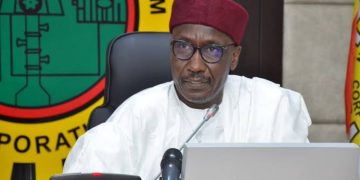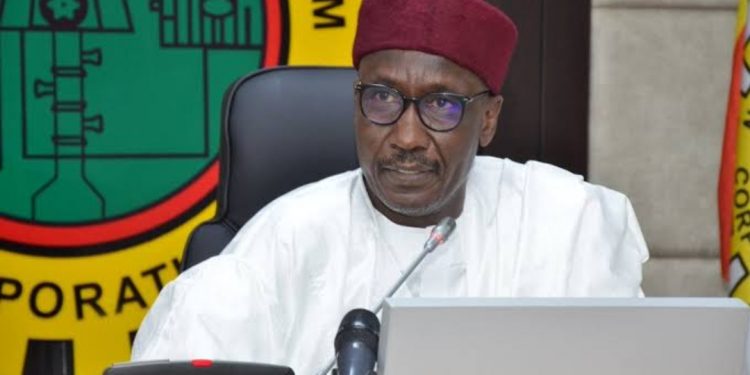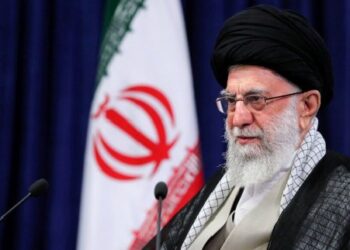By John Ikani
The Group Chief Executive Officer (GCEO) of the Nigerian National Petroleum Company Limited (NNPC), Mallam Mele Kyari has assured Nigerians that the determination of fuel prices would continue to be a decision by the federal government despite the firm’s transition to a commercial entity whose new focus will be profit-making.
Fears over a possible increase in fuel prices were expressed as many believe that it may be a condition to becoming fully commercial.
But speaking during a prerecorded interview with Channels Television, on Monday, Kyari stated that “the price of petroleum products is a policy matter. And the NNPC is going to be a supplier to the Federation at a fee. So, the issue of at what price you sell petroleum will be the decision of the state.
“The state has continued to maintain that we must continue to pay subsidy on petroleum products. We are happy to do this, but as a commercial venture, we will have a service-level agreement between us to render that service,” he said.
Although it became a Companies and Allied Matters Act (CAMA) on July 1 by the provisions of the Petroleum Industry Act (PIA), the NNPC is expected to be officially unveiled by President Buhari today (Tuesday).
The President recently deferred the full deregulation of the sector, which would have seen the removal of the controversial and opaque petrol subsidy and will gulp at least N4 trillion this year, by 18 months.
But Kyari reiterated that it would no longer be business as usual, insisting that as a commercial venture, the NNPC would just be a service provider to the government, rather than shouldering the responsibility of importation and allowing it to hurt the company’s bottom line.
“We will procure the products and we will sell to the state, and will be step on step with the country and literally, I’ve seen no indication at this point in time that the state is ready to change any price of petroleum products. It has nothing to do with our operations.
“For us, what it really means is that this is business for us. We’ll charge them a fee and at any point, so that the company can make money on behalf of its shareholders,” he said during the interview.
Kyari, who also spoke on the new demands on the new NNPC explained that it would henceforth take the issue of transparency more seriously, having earlier joined the global Extractive Industries Transparency Initiative (EITI).
“More than anything else, there’s really no plan of tying this (subsidy) to our turnover and they have no relationship,” he noted.
According to him, the new NNPC will not withdraw from the international organisation, but will rather continue to ensure more openness in its operations to attract more investments and foreign partnerships.
“Actually it now becomes more demanding to be more transparent. NNPC is a partner company for the global EITI initiative, like very many other private companies that voluntarily chose to become partner company to the EITI.
“The meaning of this is that you’re going to make certain disclosures to your shareholders and to the world community that companies ordinarily are not required to do and we will keep to that because we’re not going to withdraw as a partner company to the EITI.
“That means that there are further requirements beyond what we are doing today. Beyond just publishing your financial statements, there are very many other disclosure requirements for being a partner company to EITI.
“We believe that this is good for our company and we will continue to sustain this. And as a matter of fact, as you may be aware, we’re the only company that publishes its operational reports: production, sales and everything on a monthly basis,” he said.
Kyari explained that although there’s no statutory obligation to make those operational disclosures, the new NNPC’s commitment to getting it right remains unwavering.
“No company does this anywhere in the world. There’s no requirement to do this. As a matter of fact, I’ll borrow one of my colleagues’ view that we’re actually not just transparent, we are actually naked.
“We’re happy telling people that this is who we are. This is what we’re trying to do and on their behalf and also because companies and partners, particularly the lending community, the global energy community would like to see what you’re doing.
“Once they do, trust becomes higher and your ability to access capital becomes real and easier. And ultimately it gives you all the advantage that you require, so you lose nothing by being transparent,” he stressed.
Aside being the sole importer of petroleum products, the NNPC has yet to explain what happens to its other major function of contributing monthly to the Federation Account since by law CAMA companies only pay dividends to their shareholders annually.
What you should know
Kyari was careful not to mention that the NNPC has failed to remit to the Federation Account Allocation Committee (FAAC) for the fifth time in a row, an issue with disastrous effects that cast a gloomy outlook for the future of Nigeria’s economy.
Heritage Times (HT) reports that while the NNPC continuously hinge the issue of zero remittances to FAAC on payment of subsidy, Nigerians are already suffering from the effects of the disastrous trend in different facets of life.
The oil sector provides for 85% of Nigeria’s export earnings and 55% of its government revenues. A development which makes the nation highly dependent on the dollar for its survival.
Thus, one of the implications of NNPC’s failure to remit the much-needed foreign exchange (FX) to FAAC is that the federal, state and local governments will continue to have cash shortages since the payments constitute a major revenue source.
The issue has also left importers struggling to get the FX while households are also not spared of challenges wrought by the greenback scarcity as parents contend with the hard task of sourcing dollars to pay the tuition fees of their wards schooling abroad.
Added to the aforementioned gloomy developments is the unsustainable expenditure of billions of dollars in the rehabilitation of refineries and protection of pipelines without commensurate advantage in production as seen in Nigeria’s continual failure to meet OPEC’s quota.
As the old underperforming NNPC transitions to a commercial entity today, it is the hope of Nigerians that the new NPPC will present a real transformation in profitable style and philosophy.




































